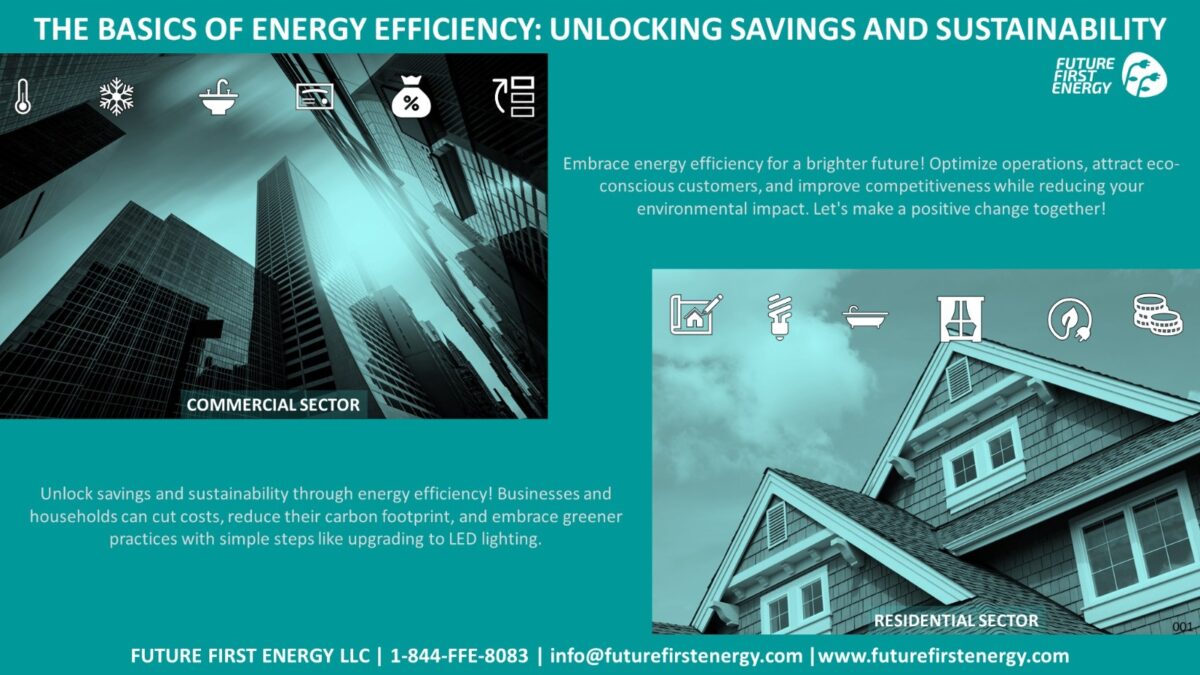The Basics of Energy Efficiency: Unlocking Savings and Sustainability for Businesses and Households
Introduction:
Energy efficiency is a simple yet powerful concept that can transform the way we consume energy in our daily lives. It’s a fundamental step towards reducing energy consumption, cutting costs, and mitigating our impact on the environment. In this introductory guide, we will explore the core principles of energy efficiency, its significance, and the myriad benefits it offers to both businesses and households.
Understanding Energy Efficiency:
At its core, energy efficiency refers to using less energy to achieve the same or even improved results. It involves adopting smart practices, technologies, and products that minimize wasted energy while maximizing output. By optimizing energy usage, we can maintain our desired level of comfort, productivity, and functionality without unnecessary energy waste.
The Importance of Energy Efficiency:
Energy efficiency is not merely a buzzword; it plays a pivotal role in addressing pressing global challenges. The most immediate benefit is cost savings. When we use energy more efficiently, we reduce our utility bills, leaving more money in our pockets to invest in other priorities.
Beyond financial gains, energy efficiency is a key player in environmental preservation. Traditional energy sources, such as fossil fuels, contribute to greenhouse gas emissions, which accelerate climate change. By reducing energy consumption, we decrease our carbon footprint, conserving resources and helping combat global warming.
Energy Efficiency in Businesses:
For businesses, energy efficiency presents an opportunity for long-term sustainability and profitability. Lowering energy expenses can significantly impact the bottom line, increasing profit margins and enhancing competitiveness. Additionally, businesses that showcase their commitment to sustainability often attract environmentally-conscious customers and stakeholders.
Implementing energy-efficient practices in operations, manufacturing, and supply chains also helps meet regulatory requirements and positions companies as responsible corporate citizens. It fosters a culture of innovation, inspiring employees to develop and adopt new energy-saving initiatives.
Energy Efficiency at Home:
In households, energy efficiency empowers individuals to take charge of their energy consumption and make a positive impact on the planet. Simple steps like using LED light bulbs, optimizing thermostat settings, and upgrading to energy-efficient appliances can yield substantial savings.
Moreover, energy efficiency enhances home comfort and health. Insulating homes properly, for instance, not only reduces energy usage but also keeps indoor temperatures stable, ensuring a cozy living environment. By choosing energy-efficient HVAC systems and appliances, we can improve indoor air quality and reduce exposure to harmful pollutants.
Practical Energy Efficiency Tips:
- Unplug Unused Devices: Many electronic devices continue to consume energy when plugged in but not in use. Unplug chargers, computers, and other devices when not needed.
- Upgrade to LED Lighting: LED bulbs last longer and consume significantly less energy than traditional incandescent bulbs.
- Set Programmable Thermostats: Program your thermostat to adjust temperatures when you are away or asleep to save energy.
- Seal Air Leaks: Inspect doors, windows, and ductwork for leaks and seal them to prevent energy loss.
- Invest in Energy-Efficient Appliances: When it’s time to replace old appliances, opt for energy-efficient models with the ENERGY STAR label.
Conclusion:
Energy efficiency is not a luxury but a necessity in our pursuit of a sustainable and prosperous future. By embracing energy-efficient practices, businesses and households can reduce costs, conserve resources, and contribute to a healthier planet. Let us all take small yet significant steps towards energy efficiency to build a brighter and more sustainable tomorrow. Together, we can make a positive impact on our lives and the world around us.



